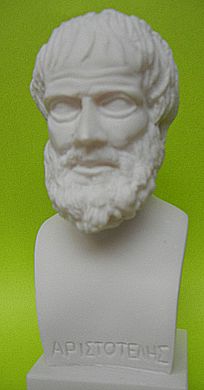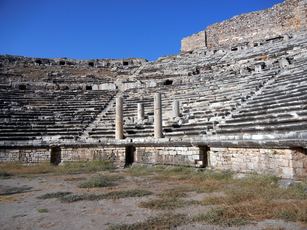Content created: 2011-09-12
File last modified:
Aristotle
The Poetics (Chapters 4-5)
Translated 1898 by Ingram Bywater
Procursus
Poetry, as Aristotle discusses it, is not just the "Roses are red, violets are blue" kind we usually first think of. It is much broader than that, and indeed he usually seems to illustrate his arguments by references to stage dramas. (The present passage would probably make perfectly good sense if one replaced the word "poetry" with "theatre" and "poet" with "actor" or "playwright" throughout.) In case it helps, here is the elegantly worded definition provided by the Britannica Concise Encyclopedia (alas no longer available these days as a smart-phone app):
Poetry: Writing that formulates a concentrated imaginative awareness of experience in language chosen and arranged to create a specific emotional response through its meaning, sound, and rhythm. …
The Britannica writer wrongly suggests that poetry must be written in order to exist. That is nonsense, of course. (It is venerable nonsense —we see Aristotle doing the same thing— but it is still nonsense.) However, the rest of the wording is pretty good. (The full Encyclopedia Britannica, in contrast, unhelpfully argues that poetry is not definable.)

Modern Soapstone Bust of Aristotle Made for Tourists
(For Aristotle, poetry contrasted saliently with rhetoric, the art of persuasion by reasoned argument. Like many later philosophers, Aristotle and his teacher Plato were both intrigued by the relationship between language and truth —and morality, for that matter— and saw the study of rhetoric as a way of examining that relationship. But I digress …)
As the present extract begins, Aristotle is launching into a history of theatrical poetry. He begins by trying to establish some first principles by which to imagine an origin for which there is no record. (Don't try this at home. Making up origins in the absence of evidence turns out to be a futile enterprise, especially if you begin to believe yourself.)
He is clearly interested in how we might explain the emotional appeal of certain kinds of linguistic products. He concludes that the process of “recognition” is involved. The word he uses is manthanein —μανθάνειν— an infinitive meaning “to know” in most of the senses of the English word, though importantly also including “to know through experience.”
I would argue that his insight about this is not limited to language but may be extended to pattern in many forms, and indeed the importance of recognition and the pleasure taken in it have come to be major fields of cognitive research in our own era.
The text here was translated 1898 by Ingram Bywater; it follows the version in On the Art of Poetry, published by Oxford University Press in 1920. In this extract, section numbers have been added to facilitate reference and class discussion. They do not correspond to traditional numbering of the Greek text.
Return to top.
Chapter 4
[1] It is clear that the general origin of poetry was due to two causes, each of them part of human nature. Imitation is natural to man from childhood, one of his advantages over the lower animals being … that he is the most imitative creature in the world, and learns at first by imitation. And it is also natural for all to delight in works of imitation.
[2] The truth of this second point is shown by experience: though the objects themselves may be painful to see, we delight to view the most realistic representations of them in art, the forms for example of the lowest animals and of dead bodies.
[3] The explanation is to be found in a further fact: to be learning [manthanein — μανθάνειν] something is the greatest of pleasures not only to the philosopher but also to the rest of mankind, however small their capacity for it; the reason of the delight in seeing the picture is that one is at the same time learning — gathering the meaning [sullogízesthai — συλλογίζεσθαι)] of things, e.g. that the man there is so-and-so; for if one has not seen the thing before, one’s pleasure will not be in the picture as an imitation of it, but will be due to the execution or colouring or some similar cause.
Return to top.
[4] Imitation, then, being natural to us — as also the sense of harmony and rhythm, the metres being obviously species of rhythms — it was through their original aptitude, and by a series of improvements for the most part gradual on their first efforts, that they created poetry out of their improvisations.
[5] Poetry, however, soon broke up into two kinds according to the differences of character in the individual poets; for the graver among them would represent noble actions, and those of noble personages; and the meaner sort the actions of the ignoble.
[6] The latter class produced invectives at first, just as others did hymns and panegyrics. We know of no such poem by any of the pre-Homeric poets, though there were probably many such writers among them; instances, however, may be found from Homer downwards, e.g. his Margites, and the similar poems of others. In this poetry of invective its natural fitness brought an iambic metre into use; hence our present term ‘iambic’, because it was the metre of their ‘iambs’ or invectives against one another. The result was that the old poets became some of them writers of heroic and others of iambic verse.
[7] Homer’s position, however, is peculiar: just as he was in the serious style the poet of poets, standing alone not only through the literary excellence, but also through the dramatic character of his imitations, so too he was the first to outline for us the general forms of Comedy by producing not a dramatic invective, but a dramatic picture of the Ridiculous; his Margites [now lost] in fact stands in the same relation to our comedies as the Iliad and Odyssey to our tragedies.
[8] As soon, however, as Tragedy and Comedy appeared in the field, those naturally drawn to the one line of poetry became writers of comedies instead of iambs, and those naturally drawn to the other, writers of tragedies instead of epics, because these new modes of art were grander and of more esteem than the old.
[9] If it be asked whether Tragedy is now all that it need be in its formative elements, to consider that, and decide it theoretically and in relation to the theatres, is a matter for another inquiry. It certainly began in improvisations — as did also Comedy; the one originating with the authors of the Dithyramb, the other with those of the phallic songs, which still survive as institutions in many of our cities. And its advance after that was little by little, through their improving on whatever they had before them at each stage.
Return to top.

Theatre at Miletus in Ancient Caria (SW Turkey)
[10] It was in fact only after a long series of changes that the movement of Tragedy stopped on its attaining to its natural form.
(1) The number of actors was first increased to two by Aeschylus, who curtailed the business of the Chorus, and made the dialogue, or spoken portion, take the leading part in the play.
(2) A third actor and scenery were due to Sophocles.
(3) Tragedy acquired also its magnitude.
[11] Discarding short stories and a ludicrous diction, through its passing out of its satyric stage, it assumed, though only at a late point in its progress, a tone of dignity; and its metre changed then from trochaic to iambic.
[12] The reason for their original use of the trochaic tetrameter was that their poetry was satyric and more connected with dancing that it now is. As soon, however, as a spoken part came in, nature herself found the appropriate metre. The iambic, we know, is the most speakable of metres, as is shown by the fact that we very often fall into it in conversation, whereas we rarely talk hexameters, and only when we depart from the speaking tone of voice.
(4) Another change was a plurality of episodes or acts.
[13] As for the remaining matters, the super-added embellishments and the account of their introduction, these must be taken as said, as it would probably be a long piece of work to go through the details.
Chapter 5
[14] As for Comedy, it is (as has been observed) an imitation of men worse than the average; worse, however, not as regards any and every sort of fault, but only as regards one particular kind, the Ridiculous, which is a species of the Ugly. The Ridiculous may be defined as a mistake or deformity not productive of pain or harm to others; the mask, for instance, that excites laughter, is something ugly and distorted without causing pain.
[15] Though the successive changes in Tragedy and their authors are not unknown, we cannot say the same of Comedy; its early stages passed unnoticed, because it was not as yet taken up in a serious way. It was only at a late point in its progress that a chorus of comedians was officially granted by the archon; they used to be mere volunteers.
[16] It had also already certain definite forms at the time when the record of those termed comic poets begins. Who it was who supplied it with masks, or prologues, or a plurality of actors and the like, has remained unknown. The invented Fable, or Plot, however, originated in Sicily, with Epicharmus and Phormis; of Athenian poets Crates was the first to drop the Comedy of invective and frame stories of a general and non-personal nature, in other words, Fables or Plots.
[17] Epic poetry, then, has been seen to agree with Tragedy to this extent, that of being an imitation of serious subjects in a grand kind of verse. It differs from it, however, (1) in that it is one kind of verse and in narrative form; and (2) in its length —which is due to its action having no fixed limit of time, whereas Tragedy endeavours to keep as far as possible within a single circuit of the sun, or something near that.
[18] This, I say, is another point of difference between them, though at first the practice in this respect was just the same in tragedies as in epic poems. They differ also (3) in their constituents, some being common to both and others peculiar to Tragedy — hence a judge of good and bad in Tragedy is a judge of that in epic poetry also. All the parts of an epic are included in Tragedy; but those of Tragedy are not all of them to be found in the Epic.
[19] …
Two interactive quizzes are available to doublecheck your understanding of this page. For the ambitious, the questions from both of them have been combined into a single "hero" version.
Quiz 1,
Quiz 2,
Hero Quiz
Return to top.

